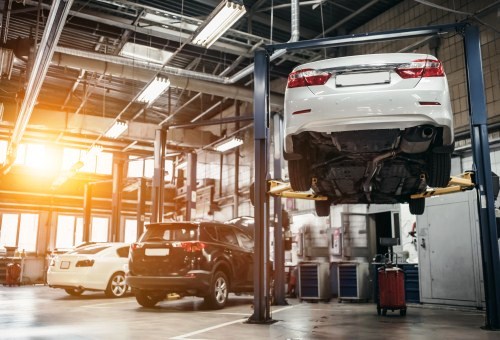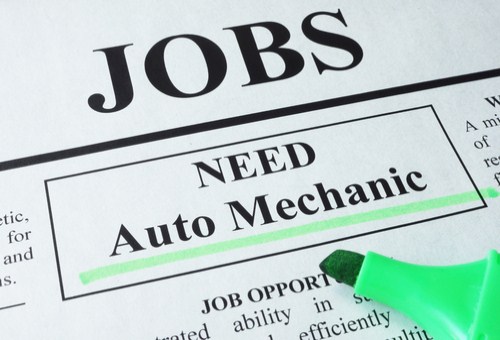
For many employed mechanics, the desire to do their own thing as a means to becoming financially independent is a powerful motivator. However, doing “your own thing” means setting up a repair shop for your own account, and this requires not only a certain amount of business savvy and strength of character, but also high levels of initiative, determination, drive, and self confidence. Nonetheless, setting up and running an automotive repair business is not only doable- it is also one of the most rewarding experiences you will ever have, despite the fact that it is one of the hardest things you will ever do. In this article, we will provide some tips and practical advice on how you too, can become a successful automotive repair business owner, starting with this-
Apart from your own certifications that allow you to work as a mechanic, you will need a business licence that is valid for three years to open, own, and operate a workshop. However, while applying for a business licence is relatively painless, the preconditions that need to be in place before you can apply for the licence can be a severe barrier to entry. Business licences do not only have to conform to the prescripts of the Australian Consumer Law, but also to some, or several, or most of 23 other Acts that range from tax laws, to workplace health and safety laws, to environmental protection laws, and local government laws, to name just a few.
The problem with all of this is that a business licence is issued to both the business and the actual premises, which means that the issuing authority may require you to obtain suitable premises as a precondition before you can apply for the business licence. While this might appear to be putting the cart before the horse, doing it this way protects everyone- you as the prospective business owner and your employees are protected against poor working conditions, while your potential customers are protected against poor business practices.
Nonetheless, the legal requirements and obligations that come with setting up shop are a veritable minefield and getting yourself into trouble without realising you were doing something wrong or skipping steps is very easy. Therefore, you would be well advised either to consult with a lawyer that specialises in this field, or to contact the licensing authorities in the various jurisdictions in Australia directly. Depending on where you want to operate, you can find more details about the licensing requirements of each jurisdiction here-
Note though that the legal requirements for owning and operating an automotive repair business in the state of Victoria are somewhat different from those for other jurisdictions. More details are available here.

Exactly how much money you will need depends on many things. Typical variables include the classes of work you want to perform, how many mechanics and administrative staff you want to employ, your chosen location, and your business structure, among others.
Let us put the money issue into some sort of perspective. If you are working at an independent workshop, i.e., not a dealership or a franchise, it might appear from your perspective that your employer is raking in tons of easy money every month, basically just for being there every day. However, what you may not know or realise, is that your employer may still be paying off his original set up costs, which could have been as high as a million dollars or more.
What you also may not know is exactly how much rent your employer pays for his premises; so if you add rent and other fixed overhead costs to his set up loan repayments, he may not make that much profit after all. In fact, he may not even draw a salary yet, or if he does, it may be less than he should be paying himself.
You will likely face many of these issues yourself, but the only way to minimise their effect on you cash flow and profitability is to have enough money available from day one. Maintaining a healthy cash flow is the single most important aspect of managing any business, and most businesses fail within a few years as a direct result of cash flow problems. Of course, it is unlikely that you will have enough start up money of your own, so you would have to borrow it, and this is where things start to get really complicated, because the first thing any lending institution will want to see is a viable business plan.
Drawing up business plans is both an exact science and an art form, which is why you do not want to attempt this yourself. What you need is a an accountant with proven experience in small businesses in general, and automotive repair businesses in particular, because these persons will factor in all costs, as well as the ramifications of some costs, such as interest on borrowed capital, depreciation of assets, running a workshop vehicle, and bank charges. More importantly though, your accountant will also calculate cash flow projections over the term of the loan, which is the single most important aspect of a business plan that lending institutions look at.
Based on the size of the business you envision, your accountant will match the entire business plan to the amount of money you need, and also factor in an amount of working capital that will cover at least three months’ worth of overheads and operational costs.
Even with a professionally drawn up business plan though, you might find that one institution will tell you are being wildly over optimistic, while based on the same figures and projections, another institution might tell you that you could not possibly hope to make a success of the business. This is where perseverance and determination both play a critical role, so apply to as many lending institutions as it takes to get the finance you need.
While the allure of a fully independent workshop is a powerful one, the trouble in obtaining sufficient start up capital (that could run to several hundred thousand dollars) is also a powerful deterrent. In fact, many prospective repair shop owners give up at this point, simply because to them, the very real risk of losing everything when they cannot make repayments far outweighs any potential rewards that will only be realised in several years’ time, if at all.
The point is that making the wrong choice at this point can have devastating effects on both your business and private finances. At issue are the facts that if you are independent, you can largely do as you please (within the framework of the law), but this comes at the very steep price of fitting out a building from scratch. On the other hand, if you elect to go for a franchise opportunity, you can get a pay-and-play store for a total capital outlay of about $220 000 to $250 000; you pay your money and get a fully kitted out store that comes with the condition that you have to follow a specific business model.
This is never an easy choice, especially given the fact that franchisors usually take about 7.5% from your gross turnover as the fee for your right to use their name and brand, as well as up to an additional 5% from your gross turnover as a contribution to a marketing budget. Moreover, most franchisors insist that you keep your cost of sales at or below a certain percentage, typically about 30% on the grounds that if you do not, you cannot maintain your cash flow, or more to the point, pay for your overheads, which includes their fees.
In the interests of fairness though, it must be stated that for the fees you pay to your franchisor, you get some real, tangible benefits. These include a fully equipped workshop in a favourable location, a lease that you do not have to negotiate, and in most cases, ongoing support, and training in running a small business. Depending on which chain you buy into, you can also get the benefit of their buying power, so can get (some) spare parts at better prices. As a practical matter though, lending institutions are sometimes more inclined to grant loans to buy into a franchise, whereas it can be extremely difficult to get finance for an independent business, and even more so if you have little, or no business experience.
Despite the benefits of buying into a franchise, there are also some real disadvantages. These include the fact that the marketing fee you pay is not always applied to your particular store. The marketing budget is used to advertise the group as a whole, so even though you make a sizeable contribution to the marketing budget, you may not always derive much, if any benefit from it. Moreover, many franchisors also insist that you carry a minimum level of stock such as brake pads, spark plugs, filters, belts, lubricants, and other items, which from your perspective as a start up business owner, represents dead money that could be better spent elsewhere.
Both independent car repair businesses and franchises have advantages and disadvantages, but it is sometimes very difficult to weigh the one against the other objectively. Therefore, this writer (who has much experience with both business models) recommends that you consult with both your accountant and your lawyer on the possible rewards, pitfalls, and legal ramifications of each business model before you commit yourself to anything.

Regardless of the business model you choose, you should understand that whether your business fails or succeeds has less to do with your leadership qualities or desire to succeed, than it has to do with the qualities, skills, attributes, character, and positive attitude of each and every person you employ.
Sadly, though, there is currently a severe shortage of highly skilled, as opposed to good or merely competent mechanics in Australia, which could make it very difficult for you to employ the type of mechanic that will set you apart from your competitors, of which there are many. Moreover, most of the best mechanics and technicians will likely have been with their current employers for many years, which makes it even more difficult to attract talented and experienced technical staff, since their current employers are likely going to some trouble and expense to retain their services.
Take yourself as an example. Would you really want to leave your current long-term employment with a considerate employer to go and work for a start-up business with an extremely uncertain future? No, you likely would not, and neither would most other skilled mechanics. Therefore, what do you do, given the fact that you now have premises and enough money, as well as all the required licences, permits, and certificates, but you need to get cracking in order to make your first loan repayment, not to mention meeting your other financial obligations on time?
You only have two choices, really. You can cast your net very wide and employ immigrant mechanics and technicians from other Commonwealth countries that produce skilled technicians, or you can set up shop in a state or territory that has a surplus of mechanics, or where the shortage of skilled staff is not quite as acute as in your current location.
Whatever you decide, you should bear in mind that you now have two primary concerns, and neglecting any one of them could cause your demise in very short order. The first is the need to attract technical staff with above average abilities and skills, since you cannot afford to train people. The second concern is the need to do whatever it takes (within reason and the law) to retain their services for as long as possible, since the unexpected loss of a skilled mechanic can have serious knock-on effects on both staff morale and profitability.
There are several things you can do to address the latter concern; one is having weekly staff meetings where problems, issues, and grievances are aired and resolved, and another is acknowledging and rewarding good work and loyalty. Both go a long way towards retaining staff, and the best part of these measures is that they cost nothing, or very little, to implement. One further advantage of a low staff turnover is that customers learn to trust you and your mechanics very quickly, which translates into repeat business from customers who would not dream of taking their vehicles to any workshop but yours.

Admittedly, the person in this image does not look like a marketing specialist, but his despondent, hangdog look is very likely the result of exhaustion and stress brought about by a lack of paying customers.
The car repair industry is brutally competitive, and therefore, the effective marketing of a new car repair business requires more than just passing out flyers. Modern marketing strategies have evolved into complex and highly sophisticated assaults on the psyches of selected target groups, and involve print, digital, and social media in ways that very few mechanics can fathom. Even though many mechanics and repair shop owners are active on one or more social media platforms, it is rare to find a workshop shop owner that understands how social media influence and affect peoples’ buying decisions.
Modern consumer behaviour and spending habits can be likened to a flowing river; if you are outside of the stream, all the money will just pass you by but if an effective marketing strategy places you in the middle of the stream, your financial success is guaranteed. Thus, failing to market your new business effectively to save money is almost the same as stopping all your clocks and watches in an attempt to stop time itself.
However, marketing specialists are the proverbial dime a dozen and the old adage that you get what you pay for is as true for incompetent marketers as it for everything else. What you need is a person or company with a proven record of accomplishment in the automotive repair industry in general and small workshops in particular. Merely setting up a website and depending on word-of-mouth advertising is not enough.
At a minimum, you need a marketing specialist with the ability to use social and other media to drive traffic to your website and other advertising mechanisms. There are various ways of doing this, but bear in mind that the best ways of doing it are both ongoing and expensive, so be prepared to spend meaningful amounts of money on effective marketing to increase sales and profitability.
From the above it should be obvious that while setting up a new car repair business is neither quick nor easy, it is nevertheless the easy part if you are in it for the long haul. The biggest and most energy-sapping challenges you will face involve keeping your new business alive and afloat, and one of the most effective ways of doing this is to take care of yourself.
In the beginning you may think that you can do it all- supervise staff, manage finances and customer care, do admin and source parts between answering the phone and finding sometimes-difficult to find technical information, but this way of running your business will wear you out sooner than you may think, no matter how enthusiastic and driven you are. Stated simply, you do not have the time for everything and once excessive stress and exhaustion set in you will start to make mistakes, you will start to forget things, and you will start to lose interest. Soon after that, you will find that just getting out of bed in the morning is becoming more and more of a challenge.
The easiest way to avoid this downward spiral is to delegate some of your tasks, or to employ administrative staff to take some of the load of your shoulders. The point is that you need to establish systems and procedures that will allow your staff to do their jobs without them having to refer to you for the smallest thing. This will do several things; it will make your staff more self-sufficient, and it will create time for you to focus on the really important things like attracting and retaining customers.
Perhaps more importantly, having proper systems and procedures in place will allow you to take breaks and holidays without you having to worry that your business will implode the moment you step out of the door, and trust us on this; you will need the occasional holiday.